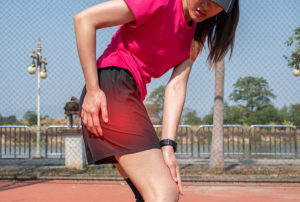Hip Impingement Treated Near Monroe Township, NJ

Known more formally as femoroacetabular impingement (FAI), hip impingement occurs when the ball of the upper leg bone (femoral head) pinches against the cup of the hip socket (acetabulum). The resulting friction can cause pain, inhibit range of motion, and possibly hasten the onset of osteoarthritis. Usually, the cause is an unusually shaped hip joint, which may be present at birth or develop during childhood.
How Is Hip Impingement Diagnosed?
Oftentimes, the first sign of hip impingement is a dull ache at the front of the hip or in the groin. After extended sitting, stiffness and tightness may develop in the hip as well. These symptoms may be incorrectly attributed to a muscle strain or hernia, which is why a professional diagnosis is so important. If hip impingement is left untreated, the excessive contact between the ball and socket can weaken the surrounding rim of cartilage (hip labrum), eventually causing it to fray or tear.
To receive an accurate diagnosis and appropriate treatment for your hip pain, you can see an experienced hip specialist at Advanced Orthopedics and Sports Medicine Institute (AOSMI) near Monroe Township, New Jersey. Typically, the diagnostic process for hip impingement includes a physical exam and imaging studies; in fact, the best tool for evaluating FAI is an X-ray.
Conservative Treatment for Hip Impingement
Once a diagnosis of hip impingement is confirmed, treatment usually begins conservatively. Some options include nonsteroidal anti-inflammatory drugs (NSAIDs) and ultrasound-guided joint injections, which can reduce painful inflammation. Additionally, the hip joint can be stabilized with physical therapy. Non-surgical treatment may be sufficient to limit the abnormal contact between the femoral head and the acetabulum; however, if the symptoms persist or worsen, surgery may be considered.
Surgical Treatment for Hip Impingement
To address severe hip impingement symptoms, a surgeon may remove excess bone, reshape the acetabulum, and then reattach the labrum. Usually, passive range-of-motion exercises are started immediately after surgery, followed by formal physical therapy within a few weeks.
Turn to AOSMI
As AOSMI, we understand that each patient is unique and deserves personalized treatment. Contact us to request an appointment with a hip specialist at our office near Monroe Township, NJ, where we can further explain the treatment options for hip impingement.







